'I hated my homophobic stepdad, then he came out as trans'
- Published
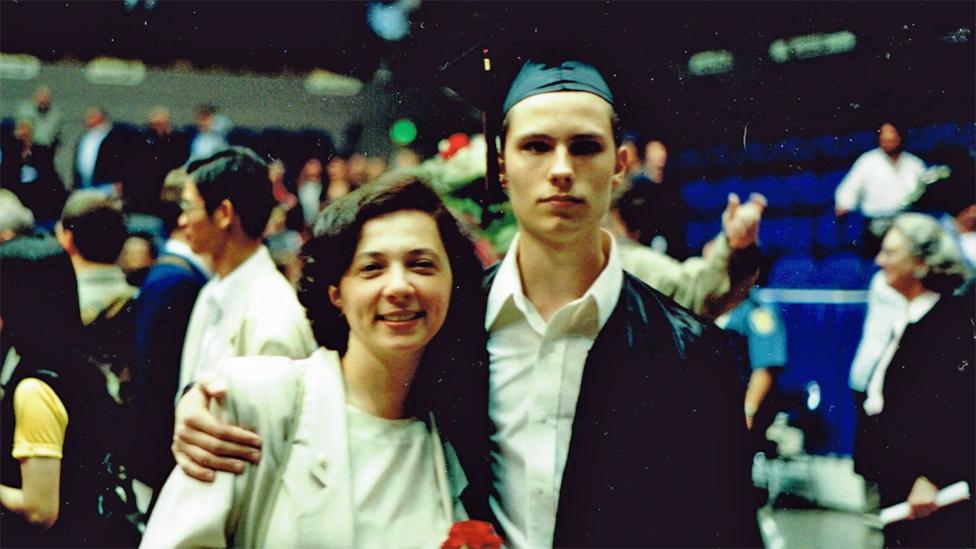
As a gay teenager in post-Soviet Russia, Wes Hurley breathed a sigh of relief when his mother married an American and they moved to the US - but he soon discovered his stepfather, James, was violently homophobic. This led to strained relations, until James underwent an unexpected transformation.
Wes Hurley's earliest memory is of his drunk father hitting his mother. He was only four years old and too young to really understand what was going on, but sometimes he would daydream that he was watching a movie. He'd put his hands up into a square frame, imagining that through the lens he created with his fingers, his life was a movie.
"My parents would be dancing and singing, and I'd imagine a fun, eccentric movie version of my life. Or they're fighting in a fun movie way. Not real fighting," Wes remembers.
His parents soon separated, and he was brought up singlehandedly by his mother, Elena, a young prison doctor.
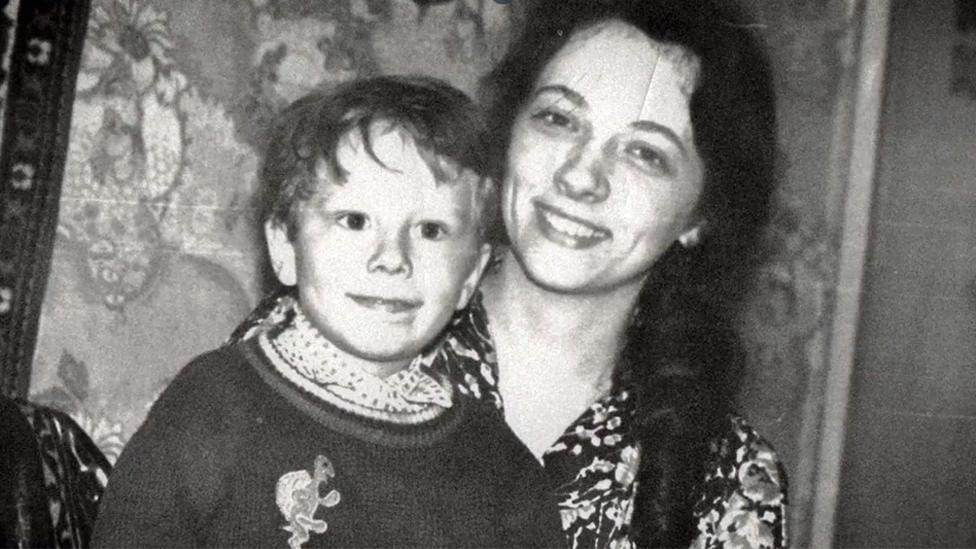
Wes and Elena
Elena was unconventional. She wasn't shy about voicing her anti-communist views, she was the only member of her family who wasn't anti-Semitic, and couldn't understand the virulent hatred people around her felt towards gay people. She always stood up for what she believed was right, and made her opinions known. This rubbed off on her son as he grew up in the late 1980s in the port city of Vladivostok, on Russia's Pacific coast.
"It was a dark time, but it was a really exciting time for me too. Our country was broken. They were teaching us Communist propaganda, and I'd stand up and say, 'You're teaching us lies,'" Wes later recalled.
Nobody had seen the break-up of the Soviet Union coming, but in 1991, when Wes was 10, it began to unravel, collapsing for good at the end of December.
"It was amazing," Wes says. "I remember we were at a neighbour's apartment. They had a colour TV. Everybody was just glued to TV and radios because it was like a thriller. Nobody knew what was going on exactly. It was an exciting, inspiring, scary moment."
At first things started to improve. There was more freedom, more food, and to Wes and Elena's delight, an influx of pirated American movies.

Find out more

Wes remembers the night he switched on the TV and Ghost appeared on the screen - a film starring Patrick Swayze, Demi Moore and Whoopi Goldberg, where the ghost of a murdered man stays on Earth, with the help of a psychic, to protect his girlfriend from danger.
"It was unlike anything I'd seen before," Wes says. "Russian films were mostly depressing and dark at the time. We hadn't seen anything like that that was so fun and enjoyable and escapist. I was obsessed with Whoopi Goldberg."
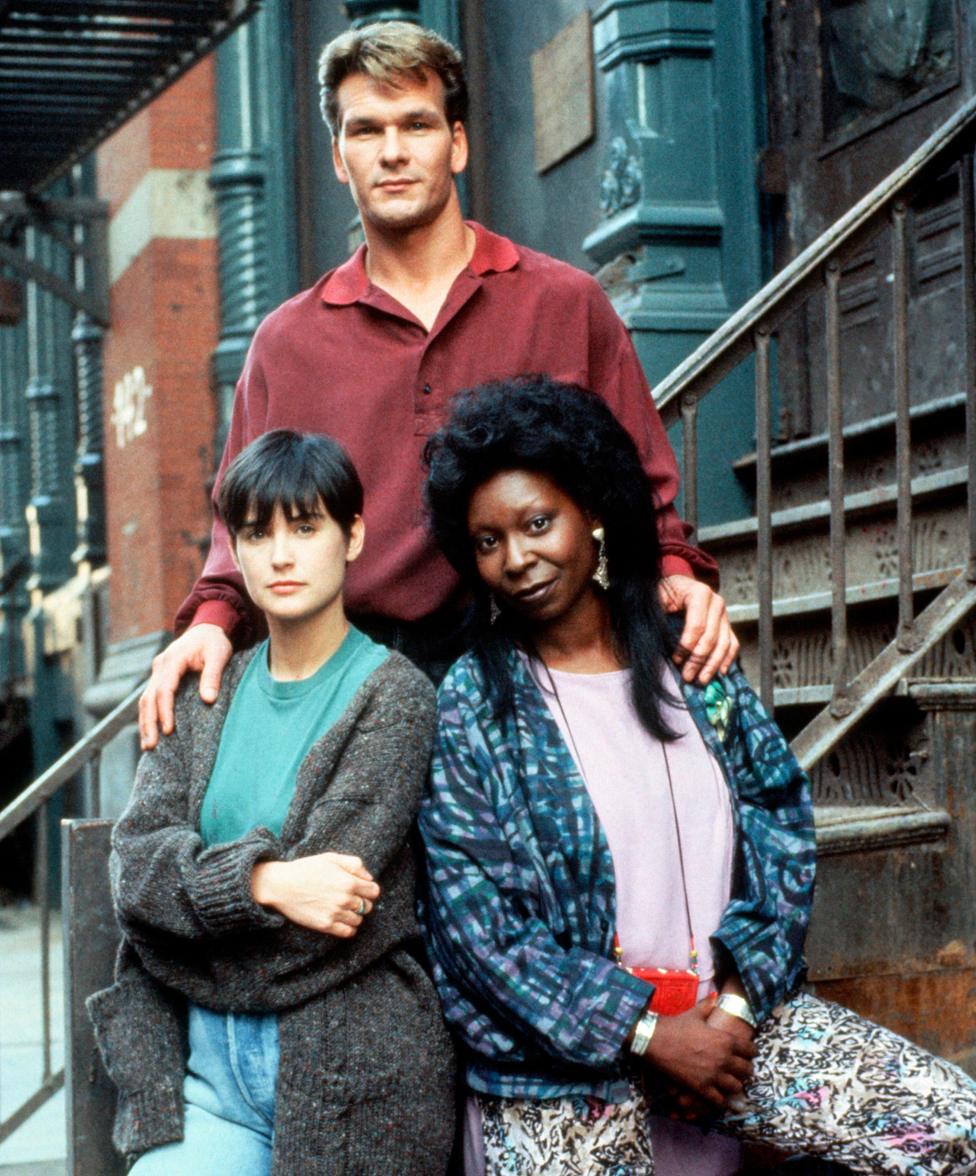
Demi Moore, Patrick Swayze and Whoopi Goldberg (right) on the set of Ghost

One of the movies that inspired Wes and Elena, even though he's embarrassed to admit it now, was Curly Sue - a "terrible movie" starring Jim Belushi, as a homeless man, Alisan Porter as a young girl he took under his wing when her mother died, and Kelly Lynch, a lawyer who gives them a temporary home. All were dubbed by a single actor, who sounded as though he was pinching his nose - perhaps to disguise his voice so he wouldn't get caught.
"It's kind of like a reverse Cinderella story," says Wes. "And I think it really spoke to us, because they go from being really poor to living in this luxury New York apartment and taking bubble baths and eating nice food, so it felt very 'I hope that happens to us.'
"It made us fall in love with the US we saw in the movies, for sure. Everything we saw was just so different from our reality. That's what started our dream of coming to the United States."
Of course, Wes and Elena knew that the movies were fictional, but the positive stories that they told became vitally important to them, giving them hope when they felt hopeless.
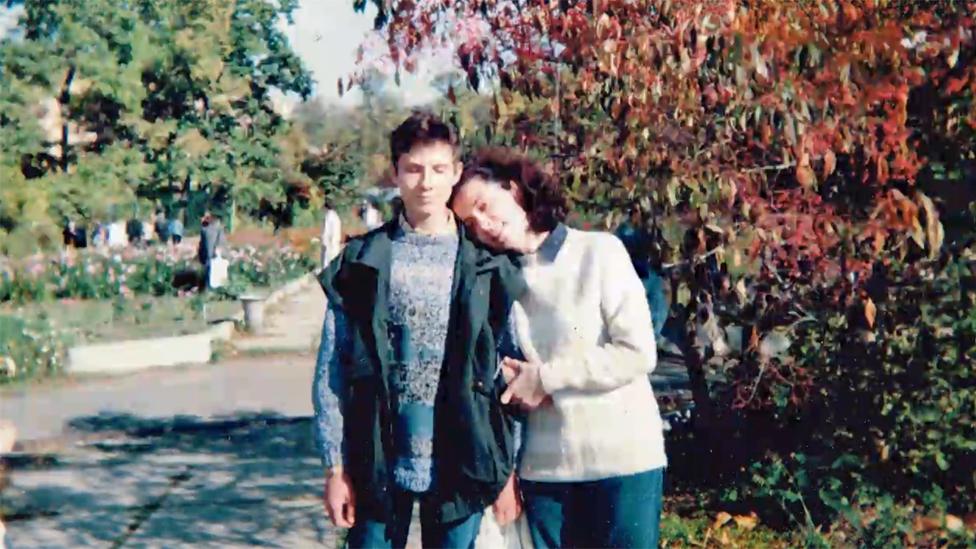
Vladivostok had always been a "post-apocalyptic landscape of unfinished construction sites, decay, extreme poverty and violence" at least in Wes's lifetime. And after the fall of the Soviet Union it became even more notorious as a haven for corruption and crime. Violent drug dealers and gang members were a perpetual danger for Wes on the city's streets and his school was barely any less violent.
It was in this forbidding environment that he came to the realisation that he was gay.
"At the time [being] gay was something sub-human, monstrous, exotic, something that 'doesn't really exist' in Russia. At the time I wasn't even sure if gay people were real or if they were made up monsters," Wes says.
He didn't mention it to Elena, who was already worried enough about him. But when he started skipping school, and even sometimes carrying a butcher's knife for protection, she took a decision to escape to the world they saw in the movies - by becoming a mail-order bride.

In the 1990s, an emerging industry of catalogues and dating services was developing to match women from countries like Russia with men from countries such as the US, Japan and Australia.
Elena provided profile information and some photos, as you would on a dating website today, and paid a small fee to be matched with American men.
She corresponded with a few of them over the next couple of years, and eventually travelled to the US to meet a man about 15 years older than her, called James - a wonderfully "exotic" name to the teenage Wes (or Vasily as he was then).
Wes's mother, Elena, explains why she became a mail-order bride in this clip from the film, Little Potato
When she came back, she was glowing and showed Wes a ring. Elena and James had got married, so she and Wes could finally go to America. It was like a dream coming true. They flew from Vladivostok, one side of the Pacific, to a new home in Seattle, on the other.
"Obviously there was so much to learn, and our English was very very bad, but we were so excited to become American and learn English that those were really fun challenges," Wes says.
Going to a high school "where you don't think you're going to get murdered" was also a huge change.
Everything about their new life was different, from the food in the supermarket to the cleanliness of the city and people smiling at them on the street. But tension soon began brewing at home.
"James was a really conservative Christian fundamentalist. He was a Russian Orthodox convert, and he wanted a Russian Orthodox wife. My mum was technically Russian Orthodox, but she wasn't conservative or fundamentalist," Wes says.
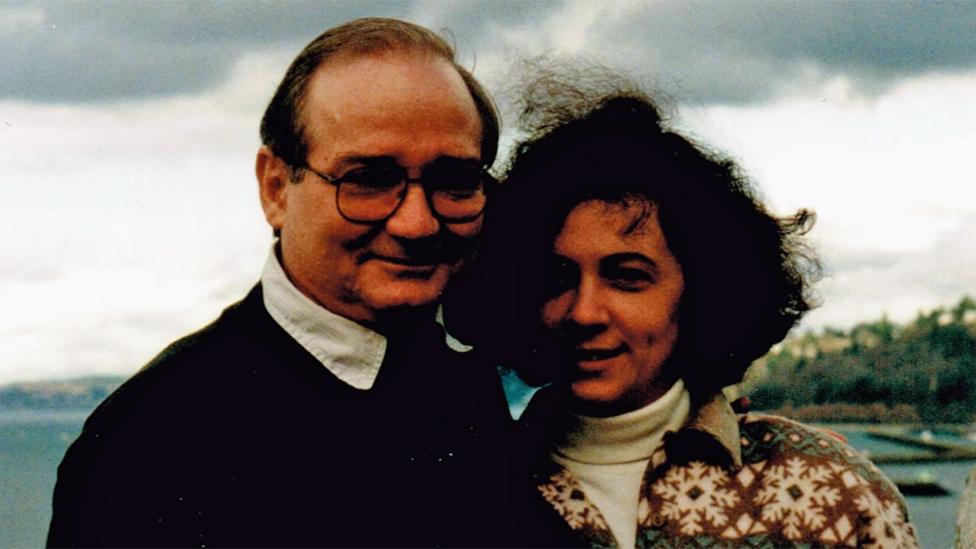
James and Elena
Elena's liberal beliefs were a surprise to James - and likewise James's conservatism was a challenge for Elena. James didn't understand how Elena could support legal abortion. He was opposed to gay rights, didn't believe in secular schools, hated the Clintons, and was appalled by Halloween - believing it to be Satanic holiday.
Wes remembers James as being very intense - often ranting and raving. He would be kind and caring one moment, the next he would fly into an awful rage. At times like this he often hinted at the possibility of sending Elena and Wes back to Russia, because they weren't Christian or conservative enough for him. They both felt extremely vulnerable.
At the same time, during their first year in the US, thanks to TV, movies, and discussions at school, Wes came to realise that he wasn't the only gay person in the world. At the age of 16, he came out to his mum.
"It was actually a funny conversation because I was brooding and moody all the time. And finally I told her I was gay and she was like, 'What, that's it? Everybody's a little gay.'" Wes says.
"And I was like, 'No mum, what do you mean?' And she said, 'Sometimes I notice good-looking women.' And I was like, 'Do you want to have sex with them?' and she said 'No'. And I was like, 'No, I'm actually really super gay.' And she said, 'I don't care if you're super gay.'
"I thought there would be more sadness or drama but she was so nonchalant about it. It was amazing."
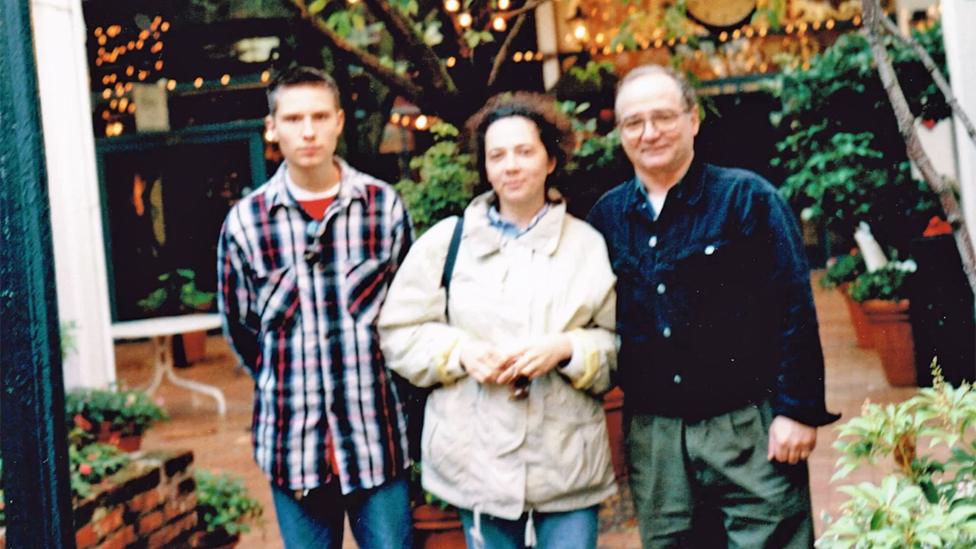
Wes, Elena and James
They both knew, though, that if they revealed Wes's sexual orientation to James, he would definitely send them back to Russia - and this really bothered Wes.
"I was already kind of moody and angry, and now learning about gay rights, thanks to the internet, I was realising how much gay people had been erased from history, and it made me so angry. I felt like James was pretty much the personification of this evil oppressive presence, so I really started to hate him," Wes says.
He would do everything that he could to avoid James, while trying not to upset him. When he was 18, he moved out and got a job. And even then, he still hid his sexuality from James.

Elena's relationship with James remained difficult, but slowly things started to change.
One year James bought a pumpkin to carve and horror movies to watch for Halloween. He had always denounced Halloween as Satan's holiday, so this represented a shift. But James had a much bigger surprise in store.
One night Wes received a phone call from his mother, and she was crying.
"Not sad crying, just cathartic crying," Wes says. "She told me she'd come home to find a strange woman sitting on her sofa, and after looking at the woman for a second, she recognised James."
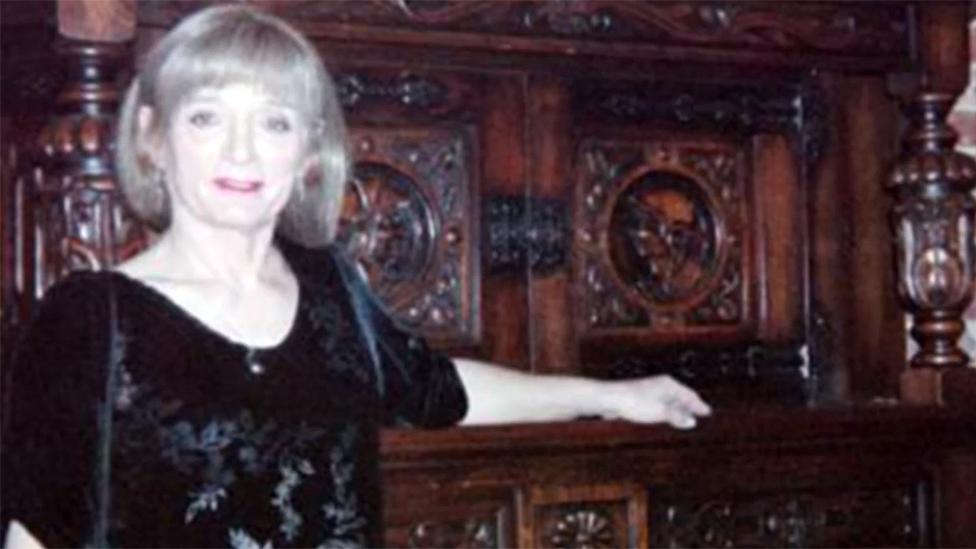
The woman on the sofa introduced herself to Elena as Janis. She explained she had struggled with her assigned gender her whole life. She had even converted to Russian Orthodoxy because she thought it would help. Marrying a Russian woman had been part of the same plan, even though Elena - "the least conservative woman in Russia", as Wes likes to call her - hadn't quite been the kind of person Janis had originally had in mind.
While Janis had, at first, been frustrated by Elena's open-mindedness, it had also helped her build up the courage to come out as a trans woman.
"I cannot say it was easy finding out that my husband was a woman. In some sense, he was the first real man in my life - the man I could count on. But it was not about me. Janis needed support and unconditional love," Elena says in Little Potato, an award-winning film that Wes has made about his experiences.

Crossing divides

A season of stories about bringing people together in a fragmented world.

Wes was absolutely blown away to learn about Janis. The discovery instantly turned a "really scary oppressive situation" into one that was "fun and exciting".
"I was dating my first boyfriend," Wes remembers, "and Janis was totally open and was hanging out with all these trans girlfriends she had. It was really special to see her blossom in the later years of her life."
Janis and her girlfriends did however become a new problem for Elena, principally because of their love for karaoke, which they asked her to film and take photographs of.
"There was karaoke night after night after night. That's when I decided it was time to divorce and move out," Elena says in Little Potato. "Transgender was fine with me but karaoke? Nobody wants karaoke every night."
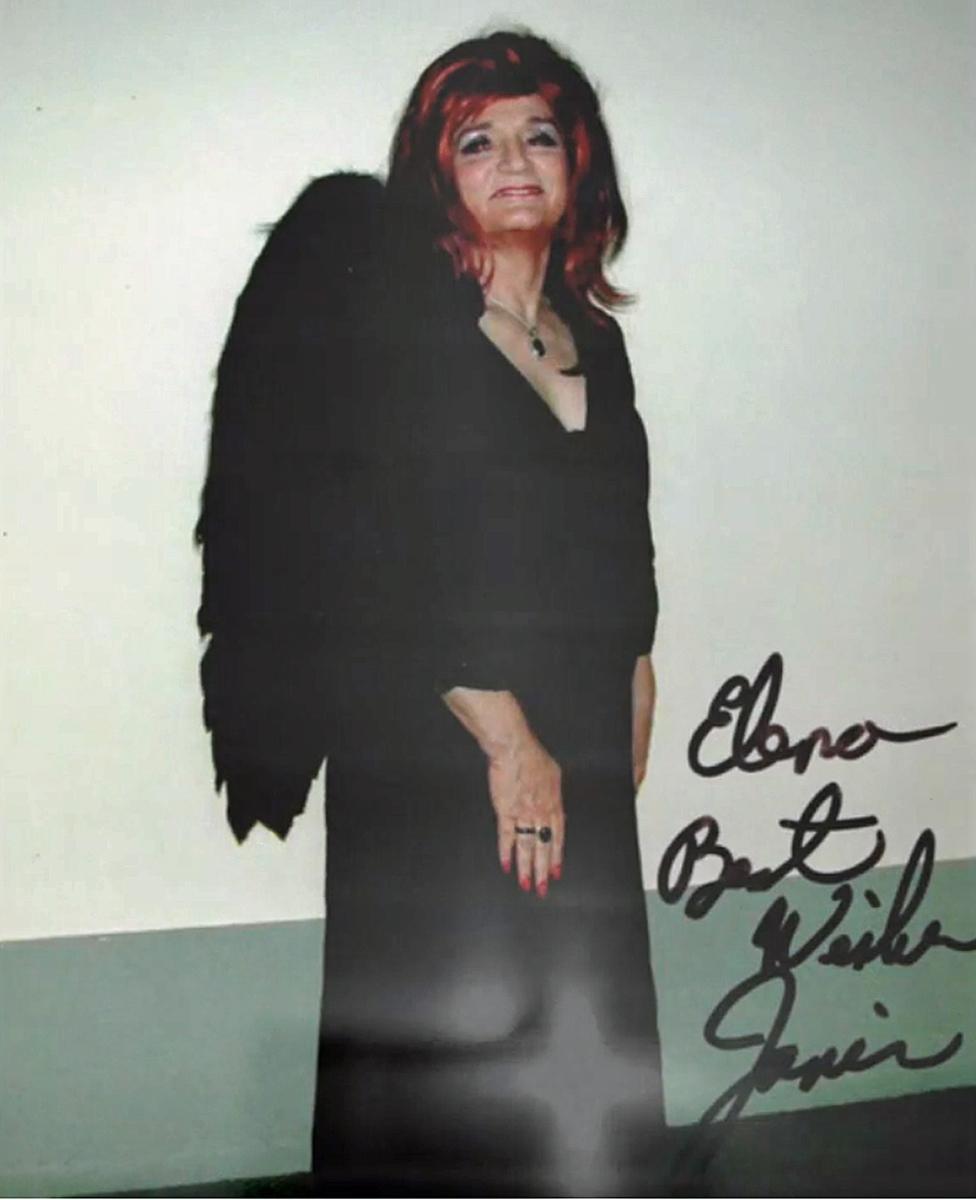

Over the years, Janis also became a devotee of Wicca, a modern pagan religion. She remained in contact with Elena and Wes but they would only see each other occasionally.
"Years later, I would see Janis on Facebook or she'd come to my film screenings. We weren't close, but she was still an important person for me," Wes says.
"Janis was every bit as loony as James in many ways. Once she became Wiccan, she would tell me how she'd used spells to move Hurricane Katrina out of the way of her hometown. She was an anti-fluoride enthusiast and was searching for towns to live in that didn't have fluoride.
"Talking to her was always awkward because I didn't know how to react to her crazy ideas, but part of me was proud of her, for just always doing whatever she wanted to do."
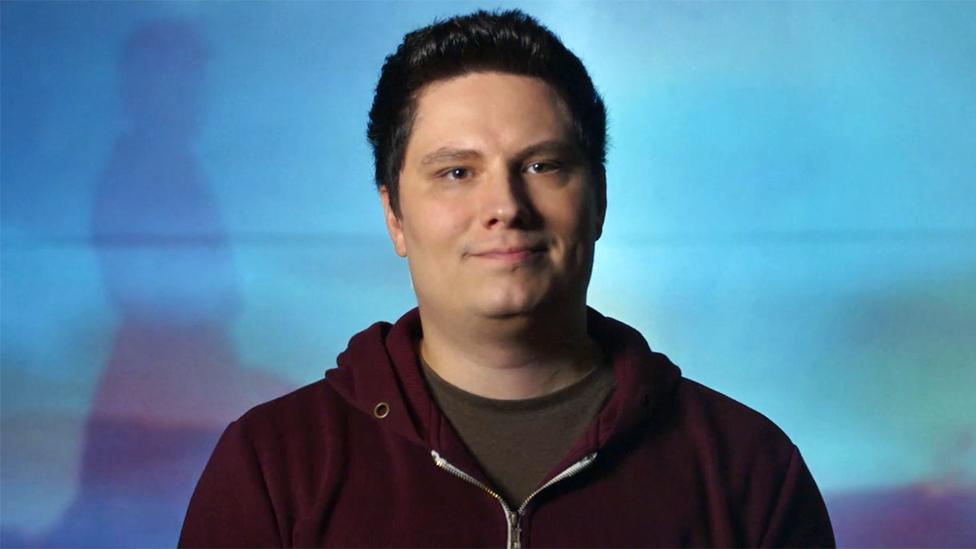
Wes Hurley in his film, Little Potato
In 2015, Wes received a message from Janis's daughter from a previous marriage to say that Janis, now 70, was fading away. So he and his mum went to visit her in hospital.
"She wasn't responding because she was in a coma. So we told her how much we loved her and that she rescued us, and how grateful we were. We were there for a couple of hours talking to her, talking to each other and crying, thinking how much our lives had changed."
Wes and Elena are still extremely close, talking several times a day on the phone.
Elena is living her American dream. One of her favourite movies is Frankie and Johnny, where Michelle Pfeiffer plays a waitress, Frankie, who resists the advances of a cook, played by Al Pacino, even though she's lonely. Elena would always say that if she could have Frankie's life she would be happy without Al Pacino - "just live in the States, have my own little apartment and job and I'd be happy."
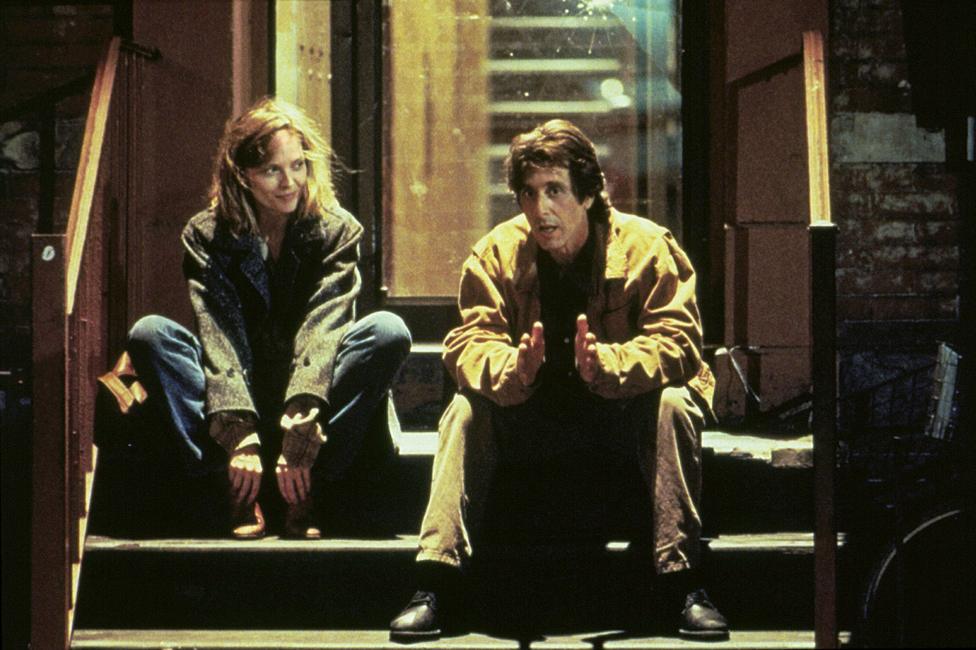
"And that's what she has now, and she's happy," says Wes.
Wes has brought their love of movies full-circle and become a film-maker. Little Potato even caught the attention of one of his biggest idols, Whoopi Goldberg, who told him she was touched by his story. He was left struggling to find the words to respond. "I was like, 'I'm so sorry I sound like an idiot, I just love you so much - you changed my life.'"
Wes Hurley has just finished shooting a feature-length version of his film, called Potato Dreams of America.
If BBC output has helped you come out - or discouraged you - please share your memories here

You may also be interested in:
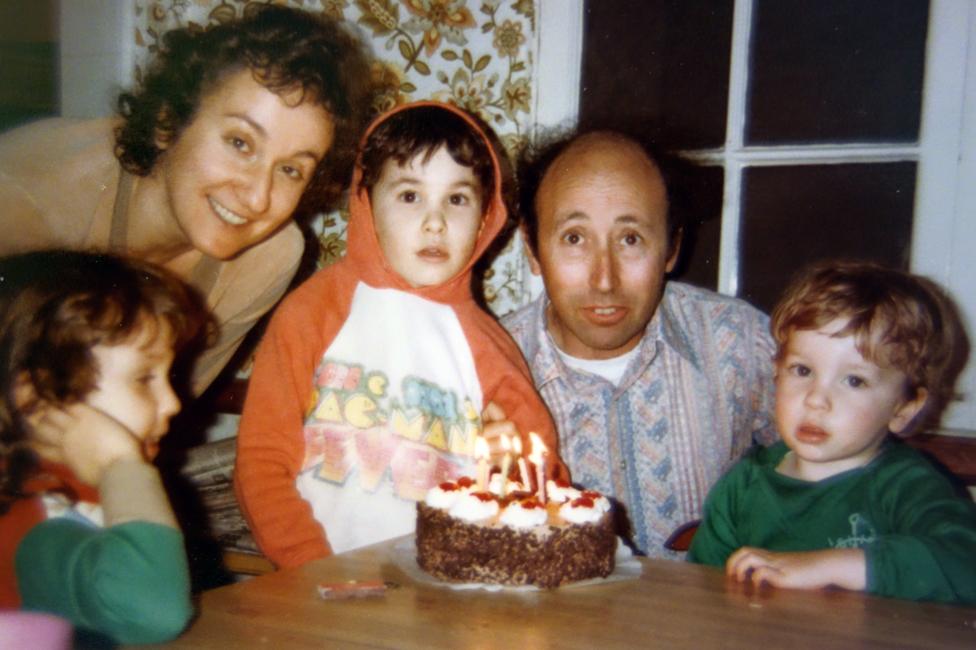
It wasn't the most obvious career choice for Karen and Barry Mason, and not one they could talk about openly. Outwardly they were a respectable family, but for years the couple ran LA's best-known gay porn shop, and distributed adult material across the US.